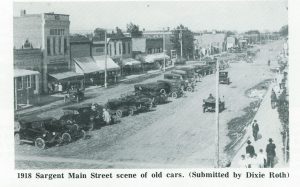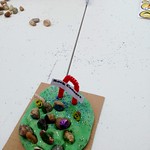The Beginnings of Our Library – or – The Politics of Sargent in 1919

The year was 1919, and the citizens of Sargent were desperately wanting a library for the town. The first mention of this in the newspaper was February 20, 1919 when the Reverend Paul Moser wrote a letter to the editor. He proposed building a town hall. This  would include a restroom for the farmer’s wives, a public drinking fountain, a room for a public library, and a big hall where business and socials could be held. He acknowledged that this would be expensive, but stated “What is there that is worthwhile, that is not expensive?”
would include a restroom for the farmer’s wives, a public drinking fountain, a room for a public library, and a big hall where business and socials could be held. He acknowledged that this would be expensive, but stated “What is there that is worthwhile, that is not expensive?”
By March 11 the Sargent Township had the “most remarkable meeting ever heard in Sargent precinct.” One hundred fifty people were present. The Sargent Women’s Club had decided that this city ought to have a library. They planned to take advantage of the Carnegie Corporation’s offer to provide the money “to build and furnish a building to any town or precinct that will provide a site for the building and make a levy for the raising of money for the maintenance of such building.“
Some people were against this idea because they had heard that the Carnegie Corporation would only furnish the books, and that the town would have to build the building. A State Library Commission representative was present to help explain the proposition to the voters. John Wall of Arcadia was also present to tell about his experience working with the Carnegie Corporation to build a library in Arcadia.
After hearing all of the wonderful things about what a library would mean to the town, many people changed their mind in favor of a new library with hearty applause. The result of the ballot was 106 for and 31 against. The plan was to levy 3 mills for the library each year for library maintenance. “All in all it was one of the best meetings of the kind ever held in Sargent.”
An editorial in the March 13, 1919 newspaper stated: “When the hospital buildings and the library buildings have actually materialized, Sargent will have something to be proud of. Taken with our fine Electric Light System, our municipal water works plant, our up to date public school building, our churches, and many fine residences, we will be in a position to invite people to make their homes here without having to blush when the invitation is given. We will certainly be able to offer many advantages that a number of larger towns cannot boast of having.”
Such excitement! Things were looking up for our little town. However, a library didn’t materialize in our town until the year 1928. Why did it take so long? What problems did they encounter? . . . To be continued.















